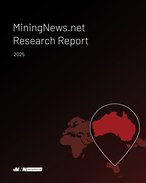This article is 9 years old. Images might not display.
BIS Shrapnel chief economist Dr Frank Gelber said despite recession impacting many other net commodity exporting nations, such as Canada, Russia and Brazil, Australia avoided a similar fate due to export strength.
“Australia is a low-cost, high quality resources exporter, and other countries simply cannot compete with that,” he said.
“While prices have fallen dramatically, export volumes are growing strongly as projects come on stream.”
Gelber believes that without this export volume growth, Australia would have gone into recession.
A decades-long boom in mining investment that drove construction and economic growth took Australian investment to new heights, but the correction, Gelber points out, will constitute a major shock to the Australian economy and GDP growth.
Fortunately, he said, the fall in resources construction would be largely offset by growth in mining output, although economic growth was expected to remain slow until non-mining sectors, in particular non-mining business investment, took over as the drivers of growth.
“We are only at the beginning of the decline in mining investment, but we are still looking at strong growth in production and exports,” Gelber said.
“The net effect is that the negative impact from falling investment is being offset by continued growth in production. Having been a strong driver of growth during the boom, mining is now not contributing at all. That’s why growth is, and will remain, weak.
“There is little risk of recession, but we’re stalled, waiting for the non-mining economy to pick up.”
According to BIS Shrapnel‘s recent economic outlook report, construction grew eightfold to its 2013-14 peak, before coal and iron ore started to fall.
Now, as the mega-gas projects wind up construction, analysts anticipate the fall in mining investment to increase.
However, despite the doom and gloom, BIS Shrapnel expects GDP growth of 2.5% in 2015-16, boosted to 3.1% in 2016-17 as LNG projects come on stream, infrastructure investment warms up and household spending increases.
The main contributor to growth, Gelber believes, will be rising public infrastructure investment.
“Hence, we believe a recession in Australia is highly unlikely,” he said.
“Growth will be soft for another three to four years as non-mining business investment remains weak, weighed down by a pervasive cost-cutting mentality, plenty of spare capacity and weak demand and profits.”























